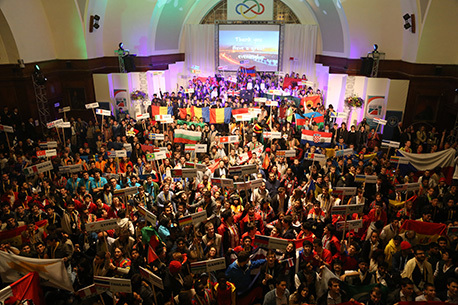IMO 2014: Africa's proud mathematical heritage
10 July 2014 | Story by Newsroom
Perceptions that Africa and Africans lag behind the rest of the world in mathematics are based on ignorance rather than reality, said Vice-Chancellor Dr Max Price, speaking at the opening ceremony of the International Mathematics Olympiad (IMO) on 7 July.
This is the first time that the 55-year old competition takes place on the African continent. With some of the brightest high school mathematics students pitting their wits against their peers from more than 100 countries, the Olympiad is billed as the "Olympics of mathematics".
"It is an honour to host the first International Mathematical Olympiad to come to Africa," said Price. "UCT focuses on research and teaching that will help African communities to grow. One of the best ways to develop a country is to develop its mathematicians.
"You may be surprised that this is the first time in its long history that the Mathematical Olympiad is being held in Africa. It's not surprising, though, when one thinks about the perceptions of Africa, because those perceptions do not naturally associate Africa with science, innovation in technology and, specifically, with leadership in mathematics.
"But I want to suggest to you that this perception is wrong, and that it reflects an ignorance of history, rather than a reality," said Price. "Africa is the cradle of humankind and in fact the cradle of mathematical thinking.
"Among the earliest mathematical calculations were made by the people who built the pyramids and who took surveys of the flooded Nile delta. In medieval times, Timbuktu, which is now in the country of Mali, was the centre of learning. Timbuktu University was established in the 12th century '“ before the universities of Oxford and Cambridge, and is considered to be one of the first universities in the world."
Further, "mathematics reached its full maturity in Africa", said Price, pointing to Euclid's Elements of Geometry which was published in the North African city of Alexandria some 2 400 years ago.
'Fearsomely tough intellectual contest'
Two millennia later, the young boffins that made their way to the tip of the continent wrote two papers, each consisting of three questions and lasting four-and-a-half hours.
"UCT has a special interest in being your host, because we are always looking for the brightest thinkers to come here," Price told the participants. "We hope you will come back to UCT someday, as students, postgraduates, researchers or lecturers."
Emeritus Professor John Webb of UCT's Department of Mathematics and Applied Mathematics describes the IMO as a "fearsomely tough intellectual contest. The mathematical content is not much more than matric maths, but the problems are very difficult. Mathematics Olympiads focus on the top end of the education spectrum."
Webb is the director of IMO 2014. He reports that in 1992, South Africa's first year in the IMO, the national team came bottom of the rankings.
"But in 1994 we got it right: we came 27th out of 69 countries and won three bronze medals," says Webb. "Since then we have come 27th three times, and have won a total of 46 medals (one gold, nine silver, 36 bronze) and 43 honourable mentions. Our record is respectable '“ but could still be better."
Western Cape MEC for Education Debbie Schäfer said that mathematics was crucial to the progress of a growing economy: "It should thus come as no surprise that improving our mathematics results is one of our strategic goals in the Western Cape, and in fact in the country as a whole. To all the international teams and their trainers, I would like to wish you the very best of luck. I am aware that the preparation time needed to take part in a competition such as this is immense."
The South African team comprises six high school students, including five from the Western Cape: Yaseen Mowzer (Grade 10) of Fairbairn College, Tae Jun Park (Grade 11) of Rondebosch Boys' High School, Sanjiv Ranchod (Grade 10) of Westerford High School, Bronson Rudner (Grade 10) of South African College High School, Robin Visser (Grade 12) of St George's Grammar School, and Nashlen Govindasamay (Grade 12) of Star College, Durban.
Story by Yusuf Omar. Image by Je'nine May.
 This work is licensed under a Creative Commons Attribution-NoDerivatives 4.0 International License.
This work is licensed under a Creative Commons Attribution-NoDerivatives 4.0 International License.
Please view the republishing articles page for more information.










